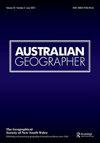在理解利益相关者对蓝胶种植园的反应时,环境比商品更重要
IF 2
2区 社会学
Q2 GEOGRAPHY
引用次数: 2
摘要
林业种植园为土地利用冲突的批判性分析提供了肥沃的土壤。决策者越来越认识到解决人工林部门有争议的问题的必要性。然而,这些努力往往以短期分析为基础,导致对动态商品环境的静态或不适当的反应。这篇研究文章提出,结合认知和社会研究方法可以阐明基于地方的土地使用冲突,这些冲突的根源不仅仅是一种特定的商品。在过去的25年里,我们探讨了利益相关者对塔斯马尼亚蓝胶(桉球)种植园的看法和态度,该地区见证了蓝胶种植园增长和管理的三个根本不同的社会经济阶段。我们的研究结果表明,随着时间的推移,个人的看法和态度与蓝胶种植园的经济特征的关系最为密切,而不是其他任何因素。由此推而广之,市场不稳定塑造了围绕蓝胶种植园的流行叙事。我们的结论是,对与历史悠久的森林种植园相关的冲突的分析,除了经济分析外,还应包括对社区成员世界观和情感的理解,以便充分解释冲突。本文章由计算机程序翻译,如有差异,请以英文原文为准。
The context is more important than the commodity in understanding stakeholder responses to blue gum plantations
ABSTRACT Forestry plantations constitute fertile ground for critical analysis of land use conflict. Policy-makers are increasingly recognising the need to address controversial issues in the plantation forestry sector. However, these efforts are often grounded in short-term analyses, resulting in static or inappropriate responses to a dynamic commodity environment. This research article proposes that combining cognitive and social research approaches can elucidate place-based land-use conflicts that at their root, are about more than just the one particular commodity under examination. We explore stakeholders’ perceptions and attitudes around Tasmanian blue gum (Eucalyptus globulus) plantations in a region that has witnessed three radically different social-economic stages of blue gum plantation growth and management over the last 25 years. Our findings show that individual perceptions and attitudes over time are most closely related to the economic characteristics of blue gum plantations than to any other factor. By extension, market instability shapes popular narratives around blue gum plantations. We conclude that the analysis of conflicts associated with long-established forestry plantations should encompass an understanding of community members’ worldviews and emotions in addition to economic analyses in order to adequately explain conflicts.
求助全文
通过发布文献求助,成功后即可免费获取论文全文。
去求助
来源期刊

Australian Geographer
GEOGRAPHY-
CiteScore
4.10
自引率
8.30%
发文量
33
期刊介绍:
Australian Geographer was founded in 1928 and is the nation"s oldest geographical journal. It is a high standard, refereed general geography journal covering all aspects of the discipline, both human and physical. While papers concerning any aspect of geography are considered for publication, the journal focuses primarily on two areas of research: •Australia and its world region, including developments, issues and policies in Australia, the western Pacific, the Indian Ocean, Asia and Antarctica. •Environmental studies, particularly the biophysical environment and human interaction with it.
 求助内容:
求助内容: 应助结果提醒方式:
应助结果提醒方式:


